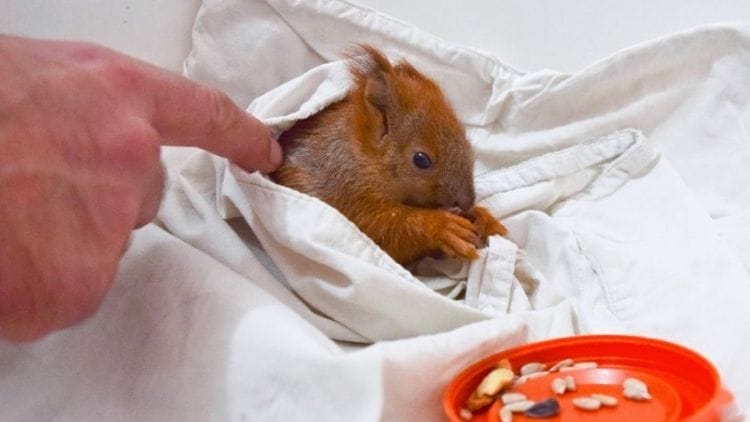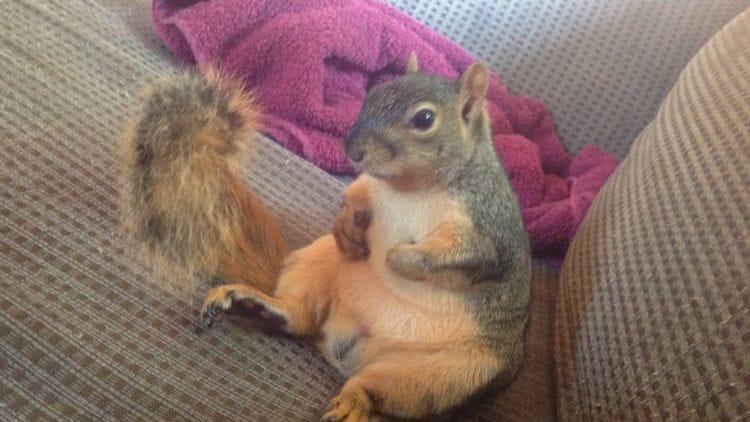Yes, squirrels can technically be kept as pets in some places with the appropriate permits and licenses. However, caring for a squirrel as a pet comes with challenges and considerations. Squirrels are wild animals with specific dietary, environmental, and behavioral needs that can be difficult to meet in a domestic setting.
Additionally, legal restrictions and ethical concerns regarding the welfare of the squirrel and its impact on local wildlife populations must be taken into account.
As such, while it’s possible to keep a squirrel as a pet under certain circumstances, it’s important to thoroughly research and understand the responsibilities involved before making the decision to do so. While squirrels are undeniably adorable and charismatic creatures, there are several factors to consider before welcoming one into your home.
Legal Considerations
Before embarking on the journey of pet squirrel ownership, it’s crucial to research the legalities in your area. Many regions have strict regulations governing the ownership of wild animals, including squirrels. Obtaining the necessary permits and licenses, if available, is imperative to ensure compliance with local wildlife laws.
Regulations and Laws
The first and foremost consideration is whether it is legal in your area to keep a squirrel as a pet. Wildlife and exotic pet regulations vary significantly from one place to another, often dictated by state or national laws aimed at protecting native wildlife and ecosystems.
Wildlife Protection Laws
In many places, squirrels are protected under wildlife conservation laws that prohibit their capture, sale, and ownership. These laws are intended to prevent the disturbance of natural wildlife populations and ecosystems.
Permits
Some regions may allow the keeping of certain types of squirrels as pets but require a permit. Obtaining a permit usually involves proving that you have the facilities and knowledge to care for the animal properly and that the animal was acquired legally.
This process can be rigorous and detailed, reflecting the seriousness of caring for a wild animal.
Health and Safety Regulations
In addition to conservation concerns, health and safety laws also play a part. Squirrels can carry diseases that are transmissible to humans and other animals. Jurisdictions that allow squirrel pets might have regulations requiring veterinary checks and vaccinations.
Species-Specific Legislation
The type of squirrel you’re considering can also affect the legality:
Native vs. Exotic
Keeping native wildlife as pets is often more heavily regulated or outright banned compared to exotic species.
For example, American red or gray squirrels may be protected, whereas exotic squirrels like the Prevost squirrel might be permissible under specific conditions.
Endangered Species
Special protections are afforded to endangered species, making it illegal to keep them as pets. Before considering a squirrel as a pet, verify if the species is listed under any endangered or protected categories.

If you’re considering a squirrel as a pet or if you’re simply curious about the diseases that can affect these animals, it’s important to understand the range of health issues they can face.
Squirrels are susceptible to various diseases, some of which can also pose risks to human health. Here’s an overview of common diseases found in squirrels:
1. Leptospirosis
- This bacterial disease can affect many animals, including squirrels. Leptospirosis is transmitted through the urine of infected animals and can contaminate water or soil. It can cause a wide range of symptoms, and in humans, it can lead to kidney damage, meningitis, liver failure, and sometimes death.
2. Rabies
- Although it’s less common for squirrels to carry rabies compared to other wild animals like raccoons or bats, the possibility still exists. Rabies is a viral disease that affects the central nervous system, leading to brain disease and death if not treated promptly.
3. Tularemia
- Also known as rabbit fever, tularemia can be transmitted from handling sick or dead animals, including squirrels. Symptoms in humans include fever, swelling of the lymph glands, and skin ulcers.
4. Parasitic Infections
- Squirrels can harbor a variety of parasites, including:
- Fleas and ticks: These can carry diseases that may be transmitted to humans and other pets.
- Intestinal parasites: Worms such as roundworms or tapeworms can infect squirrels, sometimes leading to debilitation or disease.
- Mites and lice: These can cause skin problems in squirrels and may also infest other animals or humans in close contact.
5. Squirrel Pox
- Squirrel pox, or squirrel fibromatosis, is a disease caused by a poxvirus specific to squirrels. It causes tumors on the skin, which are typically not harmful to humans but can be severe and sometimes fatal to the squirrels.
6. Nutritional Deficiencies
- Squirrels in captivity often suffer from nutritional deficiencies if their diet is not properly managed. Calcium deficiency is particularly common and can lead to metabolic bone disease, characterized by weak bones and dental problems.
Prevention and Care
- Vaccinations: For diseases like rabies, ensuring any potential pet squirrel is vaccinated (where legal and possible) is crucial.
- Quarantine: Newly acquired squirrels should be kept in quarantine and checked by a veterinarian experienced with wildlife to prevent the spread of diseases.
- Hygiene: Regular cleaning of the squirrel’s enclosure and good personal hygiene can help prevent the spread of zoonotic diseases.
- Proper Diet: Providing a balanced diet suitable for squirrels can prevent nutritional deficiencies.
Due to these health concerns and the complex needs of squirrels, keeping them as pets is generally discouraged. For those who find an injured or orphaned squirrel, the best course of action is to contact a local wildlife rehabilitator or veterinary professional who specializes in wildlife care. This ensures that the squirrel receives appropriate and humane treatment.
Ethical and Environmental Implications
Beyond the black-and-white of legal restrictions, there are also ethical considerations. Removing squirrels from their natural habitat can disrupt local ecosystems. Responsible pet ownership involves considering the broader impact on biodiversity and the potential for invasive species issues if non-native pets escape or are released into the wild.
Species Variation
When considering squirrels as pets, it’s essential to recognize that there are various species, each with its own unique characteristics and requirements:
Flying Squirrels
Flying squirrels, known for their gliding abilities, are particularly popular as pets. However, they have specific dietary and environmental needs that must be met to thrive in captivity.
Ground Squirrels
Ground squirrels, such as the popular pet prairie dog, have different care requirements than their arboreal counterparts. They need ample space for burrowing and digging, along with enrichment activities to simulate their natural behaviors.
Can You Train a Squirrel to Be a Pet?
Training a squirrel to be a pet is possible, but it requires patience, consistency, and an understanding of squirrel behavior. With proper training techniques and positive reinforcement, squirrels can learn to perform simple tasks and interact with their human companions in rewarding ways.
Can a Baby Squirrel Be a Pet?
Baby squirrels, known as kits, may seem like adorable candidates for pet companionship. However, caring for a baby squirrel requires specialized knowledge and care, as they have unique dietary and developmental needs. It’s crucial to ensure that the proper permits and licenses are obtained if attempting to raise a baby squirrel as a pet.
Can Squirrels Be Good Pets?
While squirrels can form bonds with their human caregivers and provide companionship, they may not be suitable pets for everyone. Squirrels have unique needs and behaviors that require careful attention and understanding. Before deciding to make a squirrel a pet, it’s essential to research thoroughly and consider whether you can provide the necessary care and environment for a happy and healthy squirrel companion.
Dietary Needs
Proper nutrition is paramount to the health and well-being of pet squirrels. Their diet should consist of a variety of nuts, seeds, fruits, and vegetables, supplemented with protein sources such as insects or small amounts of lean meat. Providing a balanced diet ensures that pet squirrels receive essential nutrients for growth and vitality.
Environmental Enrichment
Squirrels are highly active and intelligent animals that require mental and physical stimulation to thrive in captivity. Providing a spacious and enriched environment is essential for their well-being:
Cage Setup
Enclosures for pet squirrels should be spacious and equipped with climbing structures, branches, and platforms to mimic their natural habitat.
Outdoor Access
Some pet owners may choose to provide supervised outdoor access for their squirrels, allowing them to experience natural sunlight and fresh air.
Socialization and Training
While squirrels are not traditionally social animals, they can form bonds with their human caregivers through positive interactions and training:
Socialization
Spending time with pet squirrels and providing gentle handling from a young age can help them become more accustomed to human presence.
Training
Squirrels can be trained to perform simple tricks and behaviors using positive reinforcement techniques, such as clicker training and treats.
Lifespan and Health
The lifespan of a pet squirrel can vary depending on factors such as species, genetics, diet, and quality of care. On average, pet squirrels can live anywhere from 5 to 10 years or more in captivity. Regular veterinary check-ups and proper husbandry practices are essential for maintaining their health and longevity.

Conclusion
In conclusion, while squirrels possess undeniable charm and appeal, they are not conventional pets and require careful consideration and commitment from their owners. Before deciding to keep a squirrel as a pet, it’s essential to research thoroughly, understand the legalities and ethical considerations, and be prepared to provide the specialized care and environment that these unique animals require.
FAQ
1. Are squirrels legal to keep as pets?
- Answer: In some places, squirrels can be kept as pets with the appropriate permits and licenses. However, it’s crucial to research and adhere to local wildlife laws and regulations.
2. What legal considerations should I keep in mind before keeping a squirrel as a pet?
- Answer: Before deciding to keep a squirrel as a pet, it’s essential to research the legalities in your area regarding wildlife ownership. This includes obtaining any necessary permits and licenses and understanding wildlife protection laws.
3. Can I train a squirrel to be a pet?
- Answer: Yes, it is possible to train a squirrel to be a pet with patience, consistency, and an understanding of squirrel behavior. Positive reinforcement techniques can be used to teach squirrels simple tasks and interactions.
4. Can baby squirrels be kept as pets?
- Answer: Baby squirrels, or kits, may seem like cute pet options, but they have unique dietary and developmental needs. Proper care requires specialized knowledge, and permits may be necessary for their legal ownership.
5. What are the dietary needs of pet squirrels?
- Answer: Pet squirrels require a balanced diet consisting of nuts, seeds, fruits, vegetables, and protein sources like insects or lean meat to ensure proper nutrition and health.
6. How can I provide environmental enrichment for a pet squirrel?
- Answer: Pet squirrels need a spacious and enriched environment with climbing structures, branches, and platforms to mimic their natural habitat. Some owners may also provide supervised outdoor access for additional stimulation.
7. What is the lifespan of a pet squirrel?
- Answer: The lifespan of a pet squirrel can vary depending on factors such as species, genetics, diet, and quality of care. On average, they can live anywhere from 5 to 10 years or more in captivity with proper care.
8. Are squirrels good pets?
- Answer: While squirrels can form bonds with their human caregivers and provide companionship, they may not be suitable pets for everyone. Owners must be prepared to meet their unique needs and requirements.


You May Also Read